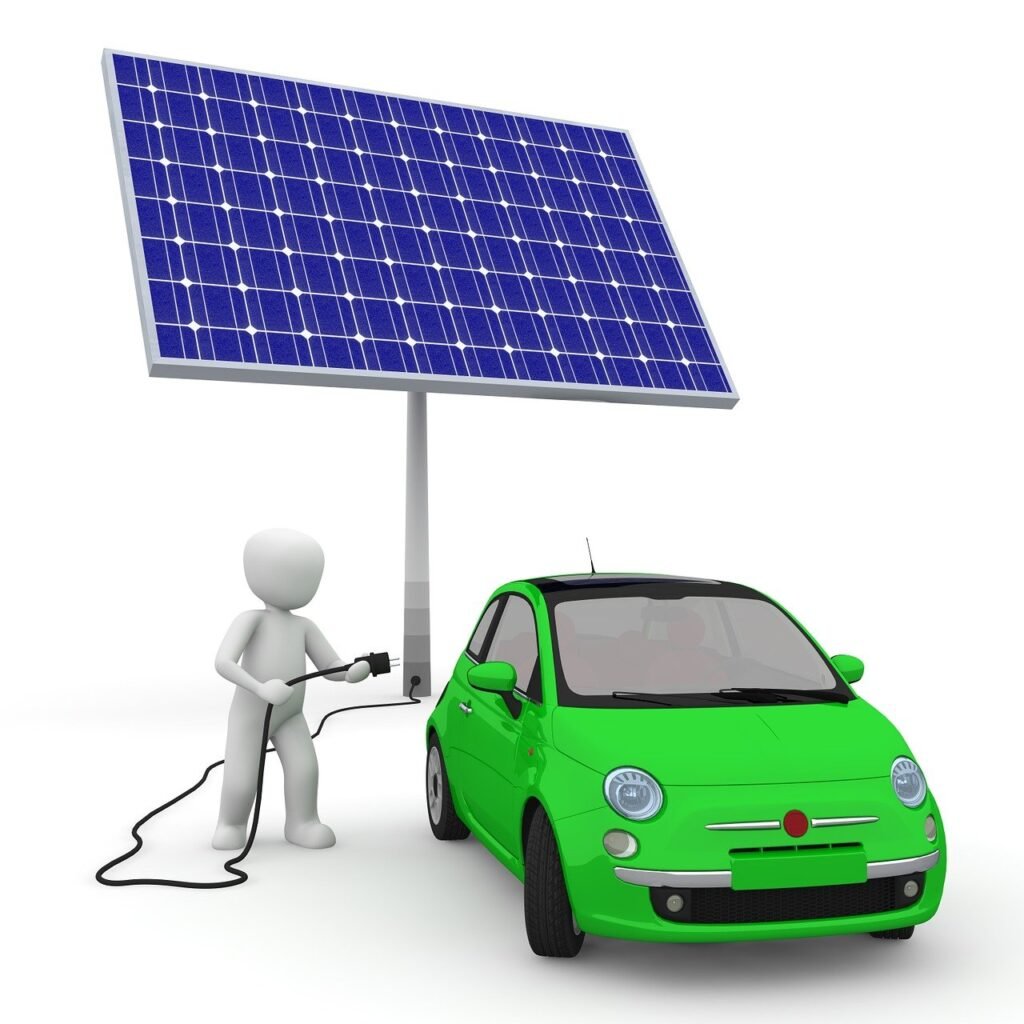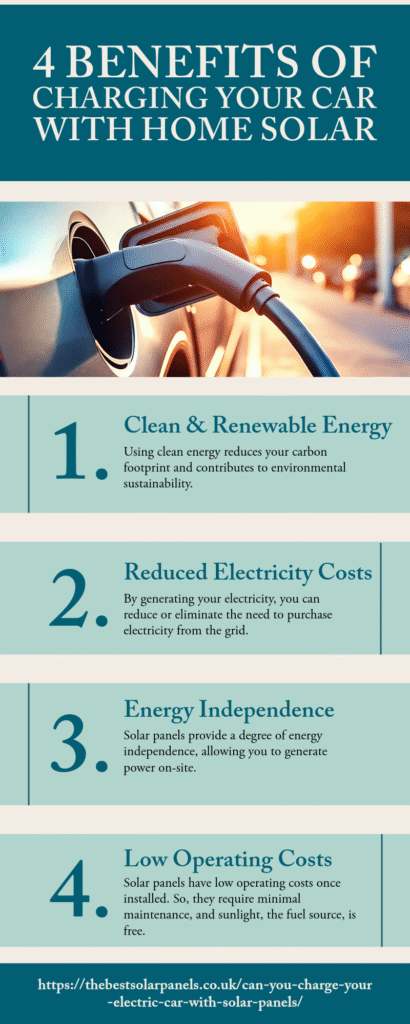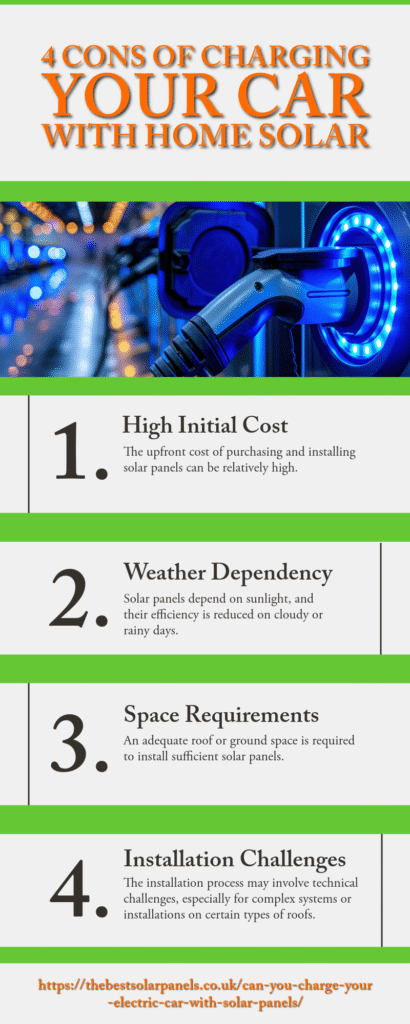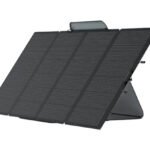Can you charge your electric car with solar panels? The marriage of electric vehicles (EVs) and solar panels emerges as a powerful alliance, promising eco-friendly and cost-effective transportation. Keep on reading if you want to know everything about charging your electric car using solar panels.

Can you charge an electric car with a solar panel?
The short answer is yes, you can charge an electric car with a solar panel. Solar panels generate electricity from sunlight, which you can use to power your EV. Besides, this symbiotic relationship between solar energy and electric vehicles contributes to a cleaner and more sustainable mode of transportation.
Here’s a brief overview of how the charging process works:
- Solar Panel Installation: You can install solar panels on a suitable surface, such as a rooftop or ground-mounted structure, where they can capture sunlight effectively.
- Electricity Generation: The solar panels convert sunlight into direct current (DC) electricity through the photovoltaic effect. Then, this electricity is fed into an inverter.
- Inverter Conversion: The inverter converts the DC electricity generated by the solar panels into alternating current (AC), which is the type of electricity used in homes and electric vehicles.
- Charging the EV: The AC electricity produced by the solar panels is then directed to the electric vehicle’s charging equipment, either through an on-site charging station or directly to the vehicle using a compatible charging cable.
- Battery Charging: The electric vehicle’s onboard charger processes the AC electricity and charges the vehicle’s battery. The charging speed depends on factors such as the power output of the solar panels and the charging capacity of the vehicle.
- Grid Connection (Optional): In cases where solar energy production is insufficient, the electric vehicle can seamlessly switch to grid power to ensure a continuous charging supply. This is especially useful during periods of low sunlight or high energy demand.

Charging an electric car with solar panels offers several advantages, including reducing reliance on traditional grid electricity, minimizing greenhouse gas emissions, and potentially providing cost savings over time. However, factors such as the size and efficiency of the solar panel system, local sunlight conditions, and the energy consumption of the electric vehicle will influence the effectiveness of solar car charging.
The most common types of EVs in the UK
It’s worth noting the prevalent electric vehicles on UK roads. Models like the Nissan Leaf, Tesla Model 3, BMW i3, and Volkswagen ID.3 are among the most popular choices, each offering varying ranges and features to cater to diverse driver preferences.
Here are some of the most common types of EVs that were popular in the UK:
- Nissan Leaf: The Nissan Leaf is one of the most popular electric cars globally. Besides, it offers a practical range for daily commuting and is known for its affordability and reliability.
- Tesla Model 3: The Tesla Model 3 is a premium electric sedan known for its long-range, high-performance capabilities and advanced autopilot features. Also, it has gained popularity for its sleek design and cutting-edge technology.
- BMW i3: The BMW i3 is an electric hatchback with a distinctive design. So, it offers a balance of performance and efficiency and is often praised for its use of sustainable materials in its construction.
- Volkswagen ID.3: The Volkswagen ID.3 is part of Volkswagen’s ID series, representing a new era for the brand with a focus on electric mobility. Also, it is a compact electric hatchback with various configurations and features.
- Renault Zoe: The Renault Zoe is a popular electric supermini known for its practicality and affordability. So, most people often choose it as a city-friendly EV with a reasonable range.
- Hyundai Kona Electric: The Hyundai Kona Electric is an electric SUV that offers a competitive range, making it suitable for both urban commuting and longer journeys.
- Jaguar I-PACE: The Jaguar I-PACE is an electric SUV with a premium design and high-performance capabilities. So, it caters to those looking for a luxurious electric driving experience.
- Audi e-tron: The Audi e-tron is an electric SUV with a focus on comfort, technology, and a high-quality interior. It’s part of Audi’s electric vehicle lineup.
- Kia e-Niro: The Kia e-Niro is an electric SUV with a practical range, making it a popular choice for those seeking a versatile and spacious electric vehicle.
- Tesla Model S: The Tesla Model S is a luxury electric sedan known for its impressive range, acceleration, and advanced features. Besides, it’s a flagship model for Tesla.
Can you use solar panels to charge your car battery?
Solar panels can be harnessed to charge your electric car’s battery, reducing reliance on grid electricity and lowering the carbon footprint associated with your daily commute. So, this practice aligns with the broader trend towards sustainable living and cleaner transportation options.
The pros and cons of using solar panels to charge your car
Using solar panels to charge your electric vehicle (EV) can be a sustainable and environmentally friendly choice, but it has advantages and disadvantages. So, here are the pros and cons of using solar panels to charge your EV:
Pros
Cons
Advantages explained
- Clean and Renewable Energy: Solar panels harness sunlight, a renewable energy source, to generate electricity. Besides, using clean energy reduces your carbon footprint and contributes to environmental sustainability.
- Reduced Electricity Costs: By generating your electricity, you can reduce or eliminate the need to purchase electricity from the grid, potentially leading to significant cost savings over time.
- Energy Independence: Solar panels provide a degree of energy independence, allowing you to generate power on-site and reducing dependence on conventional grid power.
- Low Operating Costs: Solar panels have low operating costs once installed. So, they require minimal maintenance, and sunlight, the fuel source, is free.
- Long-Term Investment: While the upfront cost of solar panel installation can be significant, it is considered a long-term investment with the potential for a favourable return on investment through reduced energy bills.
- Grid Support and Net Metering: In some regions, excess solar energy can be fed back into the grid, and you may receive credits or compensation for the surplus energy produced. This is known as net metering.
- Promotes Sustainable Practices: Using solar energy aligns with a sustainable and eco-friendly lifestyle, contributing to the global effort to reduce reliance on fossil fuels.

Disadvantages explained
- High Initial Cost: The upfront cost of purchasing and installing solar panels can be relatively high. Then, this initial investment may deter some individuals from adopting solar energy.
- Weather Dependency: Solar panels depend on sunlight, and their efficiency is reduced on cloudy or rainy days. On the other hand, seasonal variations and nighttime also impact energy production.
- Space Requirements: An adequate roof or ground space is required to install sufficient solar panels. Also, limited space can restrict the potential energy output.
- Storage Costs for Off-Grid Systems: Off-grid solar systems may require energy storage solutions, such as batteries, which can add to the overall cost of the system.
- Installation Challenges: The installation process may involve technical challenges, especially for complex systems or installations on certain types of roofs. So, we often recommend professional installation.
- Grid Reliance During Low Sunlight: During periods of low sunlight or high energy demand, you may need to rely on the grid for power, especially if you do not have energy storage solutions in place.
- Maintenance: While solar panels have low operating costs, they require occasional maintenance, such as cleaning, to ensure optimal performance.

Conclusion
Using solar panels to charge your EV offers a range of benefits, particularly in terms of sustainability and potential cost savings. However, the decision should be based on careful consideration of factors such as your location, available space, budget, and energy needs.
What EV charger works with solar panels?
Electric vehicle (EV) chargers that work with solar panels are generally compatible with standard charging infrastructure. Here are the common types of EV chargers that you can use in conjunction with solar panels:
1. Level 1 (120V) and Level 2 (240V) Chargers:
Compatibility: Most Level 1 and Level 2 EV chargers are compatible with solar panels. Also, these chargers use standard household AC power.
Integration: Solar-generated electricity can be fed directly into the grid, and the EV charger draws power from the grid as needed. Besides, some chargers may have built-in capabilities to prioritize solar-generated electricity when available.
2. Smart and Connected Chargers:
Compatibility: Smart and connected EV chargers can be compatible with solar panels.
Integration: These chargers often come with connectivity features that allow users to monitor and control charging remotely. On the other hand, you can configure some smart chargers to optimize charging based on solar energy production.
3. DC Fast Chargers:
Compatibility: DC fast chargers may have specific compatibility requirements.
Integration: You can integrate solar-generated electricity into the overall power supply, but the specific integration details may depend on the charger’s design and specifications.
4. Solar Inverter and EV Charger Combo:
Compatibility: Some manufacturers offer integrated solutions that combine a solar inverter and EV charger.
Integration: These systems can seamlessly manage solar power for both the home and EV charging. Also, they often include monitoring features to track solar production and EV charging.
5. Bidirectional Chargers (V2G):
Compatibility: Bidirectional chargers, also known as Vehicle-to-Grid (V2G) chargers, can be compatible with solar panels.
Integration: These chargers allow energy to flow both to and from the EV, enabling users to use their EV as a power source for their home or even the grid. So, solar-generated electricity can contribute to this bidirectional flow.
Considerations for Integration:
- Solar Charge Controller: A solar charge controller may be necessary to manage the flow of solar electricity to the EV charger, preventing overcharging and ensuring efficient use.
- Smart Home Energy Management Systems: Some users opt for comprehensive home energy management systems that integrate solar panels, energy storage, and EV charging. These systems can optimize energy use based on solar production and consumption patterns.
- Inverter Compatibility: Ensure that the solar inverter, if separate from the EV charger, is compatible with the charging infrastructure and can efficiently manage the integration of solar power.
- Professional Installation: For optimal integration, especially in complex systems, we recommend installing the setup by professionals with expertise in solar energy and EV charging.
How many solar panels do you need to charge an EV?
The number of solar panels needed to charge an electric vehicle (EV) depends on several factors, including the energy consumption of the EV, the efficiency of the solar panels, local sunlight conditions, and the desired level of charging. Here’s a basic overview to help you estimate the number of solar panels required:
1. Understand Your EV’s Energy Consumption:
- Kilowatt-hours per Mile (kWh/mile): Determine your EV’s energy consumption in kilowatt-hours per mile. This information is often provided in the vehicle’s specifications or user manual.
- Daily Driving Distance: Estimate your daily driving distance in miles. Multiply the kWh/mile by the daily driving distance to get your daily energy consumption.
2. Assess Solar Panel Efficiency:
- Solar Panel Efficiency: Solar panels have different efficiency ratings, representing the percentage of sunlight they can convert into electricity. So, higher-efficiency panels generate more power for a given area.
- Daily Sunlight Hours: Consider the average daily sunlight hours at your location. This information is available through solar resource maps or online tools specific to your region.
3. Calculate Solar Panel Output:
- Solar Panel Output: Multiply the total daily energy consumption of your EV (kWh) by the inverse of the solar panel efficiency and the daily sunlight hours.

4. Example Calculation:
Let’s say your EV consumes an average of 0.3 kWh/mile, and you drive 30 miles per day. You have solar panels with an efficiency of 18%, and your location receives an average of 5 hours of sunlight per day.

5. Consider Battery Storage:
If you want to charge your EV at night or during periods of low sunlight, you may also consider incorporating a solar energy storage system (battery). So, this allows you to store excess energy generated during the day for later use.
6. Professional Assessment:
For a precise estimate tailored to your specific situation, it’s recommended to consult with a solar professional. So, they can conduct a site assessment, consider local conditions, and provide accurate calculations based on your energy needs and available space.
Keep in mind that this is a simplified calculation, and actual results may vary based on factors like shading, panel orientation, and local weather conditions
Should you charge your EV with solar panels?
Charging your EV with solar panels aligns with a sustainable and environmentally conscious lifestyle. It offers the opportunity to reduce your carbon footprint and contribute to the broader effort to combat climate change. While initial costs may pose a barrier, the long-term benefits in terms of cost savings and environmental impact can outweigh these concerns.
Can you charge a Tesla with solar panels?
Yes, you can charge a Tesla with solar panels. You can charge Tesla vehicles from various power sources, including solar energy. Besides, Tesla even offers its solar solutions, providing a seamless integration of clean energy for both your home and your electric vehicle.
Conclusion
To sum up, integrating solar panels for charging electric vehicles is a compelling step towards sustainable transportation. It aligns with the global effort to reduce emissions and transition to cleaner energy sources.




Leave a Reply